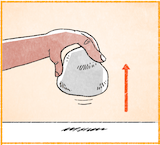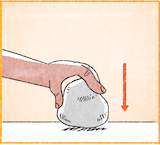

เขากำลังเฮ็ดหญัง กะมีคนหนึ่งเนาะ ใซ้มือเนาะ อาดสิเป็นมือข้างซ้ายเนาะ มือข้างซ้ายข้างเดียว กำลังจับก้อนหิน จับก้อนหินก้อนหนึ่ง แล้วกะญกขึ้น
เขาจับเฮ็ดหญัง เขาญกขึ้นเฮ็ดหญัง กะจักคือกัน เขาอาดสิจับลองเบิ่งว่าก้อนหินอันนี้มันสิหนักบ่ สิญกขึ้นได้บ่ กะสิปะมานนั้นหนะ เขากะใซ้มือข้างซ้ายของเขานั้นหละ จับก้อนหิน แล้วกะญกขึ้น ลองเบิ่งว่ามันสิญกหนักบ่ หลือว่าญกได้บ่ ปะมานนั้นเนาะ
5
เขากำลังเฮ็ดหญัง กะมีมือหนึ่งเนาะ เบิ่งไปหนะกะเห็นมือหนึ่ง กะอาดสิเป็นมือคนนี้หละ กำลังจับก้อนหินอยู่ แล้วกะวางลง
แล้วเป็นหญังเขาคือจับก้อนหินวางลง เขากะอาดสิแบบว่าอยากสิลองเบิ่ง แล้วเขากะจับก้อนหินญกขั้น แล้วกะสิ อาดสิญกลง ตอนนี้เฮาเห็นว่าเขากำลังญกก้อนหินลง หลือว่าวางก้อนหินลงเนาะ เขากะอาดสิญกอยู่ แล้วกะวางลงปึ่บลงไปเนาะ
ก้อนหินหนิมันเป็นแบบใด ก้อนหินหนิกะสิเป็น เป็นก้อนหินเนาะ กะสิอะทิบายบ่ถืก แต่ว่ามันเป็นสิ่งที่เกิดมาตามทัมมะซาด หลือว่าสิ่งที่เกิดขึ้นมาเอง ตามทัมมะซาดเนาะ คนบ่สามาดส้างก้อนหินขึ้นได้เนาะ กะอาดสิเกิดมาจากหินพูเขา หลือว่าหินตามทัมมะซาด หินต่างๆ ที่มันเกิดมาเองตามทัมมะซาดหละเนาะ
Link to overview page
Link to dictionary
| Isaan | Pronunciation | Tones | Thai | English/Notes |
|---|---|---|---|---|
| เขา | khao | M | เขา | personal pronoun: he, she |
| กำลัง | gam-laŋ | M-HR | กำลัง | auxiliary indicating continuous or progressive action |
| เฮ็ด | het | H | ทำ | to do, to make |
| หญัง | ɲaŋ | M | อะไร, เป็นหญัง = ทำไม | 1. what {เขากำลังเฮ็ดหญัง = What is he doing?} {ธูปเอาไว้เฮ็ดหญัง = What are incense sticks for?} 2. something, anything, (nothing) 3. เป็นหญัง[...]คือ in initial position: why {เป็นหญังเขาคือใส่บักพิกลงไปในกวยเตียว = Why is he putting chili in [his] noodle soup?} {เป็นหญังหน้าต่างมันคือเปิด = Why is the window open?} {เป็นหญังมันคือมีควนไฟ = Why is there smoke?} |
| กะ | ga | M | ก็ | 1. then, consequently 2. also |
| มี | mi: | HR | มี | 1. to have 2. there is |
| คน | khon | HR | คน | person, people |
| หนึ่ง | nʉŋ | H | หนึ่ง | 1. one 2. after adjective: intensifier {บักคักหนึ่ง = very much} {อันบักใหญ่หนึ่ง = very large}, or attenuates the meaning {กะดาดมันแผ่นน้อยๆ หนึ่ง = the piece of paper is [relatively] small} |
| เนาะ | nɔ | H | เนาะ | final particle: makes the statement softer, looking for agreement |
| ใซ้ | sai | HF | ใช้ | to use |
| มือ | mʉ: | HR | มือ | 1. hand 2. front leg/paw (e.g., of a cat) |
| อาด | a:t | LF | อาจ | 1. might, may, will 2. likely |
| สิ | si | M | จะ | future tense auxiliary {เขากำลังสิตื่น = he's about to wake up} {สิไปตะหลาด = [I'm] going to the market} |
| เป็น | pen | M | เป็น | 1. to be, to exist 2. to be able to 3. to suffer, sth. happens to 4. เป็นหญัง[...]คือ in initial position: why? {เป็นหญังเขากะคือแปงฟัน = Why is he brushing his teeth?} {เป็นหญังเคี่ยงบินมันคือสิตก = Why is the airplane falling down?} |
| ข้างซ้าย | kha:ŋ-sa:i | LF-HF | ข้างซ้าย | left, (on the) left side |
| ข้าง | kha:ŋ | LF | ข้าง | 1. side {มีหูจับสองข้าง = there are handles on both sides} 2. next to {วางอยู่ข้างๆ ก่องใบใหญ่ = it's placed next to the large box} {เขายืนอยู่ข้างๆ อีกพุหนึ่ง = he's standing next to another person} 3. clf. for body parts which come in pairs (eyes, ears, legs etc.) {เขามีตาสองข้าง = she has two eyes} |
| เดียว | di:ao | M | เดียว | only, alone, single |
| จับ | jap | M | จับ | 1. to grasp, to hold {เขาจับมือกัน = they're holding hands} {เขายืนจับไอติมอยู่ = she's standing, holding an ice cream} 2. to catch, to arrest {จับพุล้าย = to arrest a criminal} |
| ก้อนหิน | gɔ:n-hin | HF-M | ก้อนหิน | stone |
| ก้อน | gɔ:n | HF | ก้อน | 1. piece, lump, mass, chunk 2. clf. for bars of soap, stones, clouds, ice cubes |
| แล้ว | lɛ:o | HF | แล้ว | 1. finished 2. already 3. and then, and next (especially แล้วกะ) 4. auxiliary for past tense |
| ญก | ɲok | H | ยก | 1. to raise {ญกมือขึ้น = to raise the hand} {ญกโตอย่าง = to give an example} 2. to lift {เขากำลังญกก้อนหินขึ้น = he's lifting up the stone} |
| ขึ้น | khʉn | LF | ขึ้น | 1. to go up, to increase 2. sun: to rise {ตะเว็นกำลังขึ้น = the sun is rising} 3. more 4. bus/train etc.: to get on, to board {พุโดยสานขึ้นลดไฟเบิดแล้ว = all passengers have boarded the train} |
| จัก | jak | M | จัก | 1. answer to a question: [I] don't know, don't know exactly, [I'm] not sure {พุซายคนนี้เขาเถ้าไป่ จัก จักเถ้าหลือบ่เถ้า เบิ่งบ่ค่อยออก = Is this man here already old? I don't know. I can't see clearly whether he's old or not.} {เขาเว้ากันอยู่ใส จักคือกัน = Where are they talking? I don't know either.} 2. exact(ly), what exactly {จักต้มอี่หยังกะบ่ฮู้ = I don't know what (exactly) he is cooking} {บ่ลู้คือกันจักปาอี่หยัง = I don't know either what kind of fish this is} 3. how much/many? {ต้นไม้มีจักต้น = How many trees are there?} {ตอนนี้จักโมงแล้ว = What time is it now?} {มือของเฮานี้สิมีจักนิ้ว = How many fingers do our hands have?} 4. a bit, a little bit {จักหน่อย/จักหน่อยหนึ่ง = a bit, a little bit} |
| คือกัน | khʉ:-gan | HR-M | เหมือนกัน | 1. also, likewise, similarly {ยินดีที่ได้ฮู้จักคือกันคับ = Nice to meet you too!} 2. in negative sentences: either {บ่ลู้คือกัน = I don't know either} {จักคือกัน = I don't know (either)} |
| ลอง | lɔ:ŋ | HR | ลอง | to try, to taste, to test |
| เบิ่ง | bəŋ | H | ดู | 1. to look at, to see, to watch {เบิ่งโทละทัด = to watch TV} {เบิ่งหนัง = to watch a movie} 2. to guess {เบิ่งซงแล้ว ... = [I] guess / from what it looks like ...} |
| ว่า | wa: | H | ว่า | 1. that, as {คำว่า X = the word X} 2. to say |
| อัน | an | M | อัน | 1. thing, object 2. general clf. for objects |
| นี้ | ni: | HF | นี้ | 1. this 2. here |
| มัน | man | HR | มัน | it (also used to refer to people) |
| หนัก | nak | M | หนัก | heavy |
| บ่ | bɔ: | H | ไม่ | 1. no, not 2. question particle, transforming a statement into a question Notes: spelling exception in line with common usage on social media |
| ได้ | dai | HF | ได้ | 1. can 2. to get, to obtain 3. before verb: indicating past tense 4. บ่ได้ + verb: not |
| ปะมาน | pa-ma:n | M-HR | ประมาณ | 1. about, approximatively 2. to guess, to estimate |
| นั้นหนะ | nan-na | HF-M | final particle: for emphasis | |
| ของ | khɔ:ŋ | M | ของ | of, belonging to |
| นั้นหละ | nan-la | HF-M | นั่นแหละ | auxiliary for emphasis at the end of a phrase |
| หลือ | lʉ: | M | หรือ | or |
| นั้น | nan | HF | นั้น | that, there |
| ไป | pai | M | ไป | 1. to go 2. auxiliary indicating action extending into the future |
| หนะ | na | M | final particle | |
| เห็น | hen | M | เห็น | to see |
| นี้หละ | ni:-la | HF-M | นี่แหละ | auxiliary for emphasis at the end of a phrase |
| อยู่ | yu: | H | อยู่ | 1. to be (located) at 2. yet, still 3. auxiliary indicating continuous or progressive action {ทอดปาอยู่ในกะทะ = (in the process of) frying a fish in the pan} {แม่กำลังเมี้ยนเฮียนอยู่ = mother is cleaning/tidying up the house} |
| วาง | wa:ŋ | HR | วาง | to place, to set/put down {โทละสับ/phone: วางสาย = to hang up} {มีเกิบวางอยู่ในก่อง = there are shoes in the box} {มือข้างหนึ่งเขาวางอยู่เทิงโต่ะ = he's put one of his hands on the table} |
| ลง | loŋ | HR | ลง | 1. to descend, to lower, to go down 2. down 3. bus/train etc.: to get off, to disembark {คนกำลังลงลดบั่ด = people are getting off the bus} 4. boat/ship etc.: to get on, to board {เขากำลังญ่างลงเลีย = he's boarding/getting on the boat} |
| คือ | khʉ: | HR | คือ | 1. to be, to resemble, like, as 2. why {บักหล้าคือบ่เก็บโต่ะแน่ = [addressing a young boy] Why haven't you cleared the table?} |
| แบบ | bɛ:p | LF | แบบ | 1. example, model, kind 2. style, form, pattern, design |
| อยาก | ya:k | LF | อยาก | to want, to wish |
| ขั้น | khan | LF | เมื่อ | when, if |
| ตอนนี้ | tɔ:n-ni: | M-HF | ตอนนี้ | now |
| เฮา | hao | HR | เรา | 1. personal pronoun: we 2. personal pronoun: I |
| ปึ่บ | pʉp | H | used for emphasis as in ... ปึ่บ ... ตึ่บ | |
| หนิ | ni | M | นี่แหละ, เหรอ/หรอ | 1. particle used to emphasize a statement or form (or add to) a question {เป็นตาแซบคือหญังหนิ = it's really tasty} {เคี่ยงพอเท่าๆ หนิ = the [radio] is appropriately sized (i.e., not too large)} 2. variant of นี้ = this Notes: translation to be determined; maybe sometimes like Thai นี่แหละ; other examples given: อยู่ใสหนิ อยู่ตลาดหนิ กินเข้าไป่หนิ |
| ใด | dai | M | ใด | 1. which, that one which, what, how {เขานั่งแบบใด เขานั่งขดตะหมาดอยู่ = How is he sitting? He's sitting cross-legged.} {ตอนใด = when?} 2. whichever, whoever {หม้องใดหม้องหนึ่ง = some place, somewhere} {ขั้นเฮาอยากตื่นญามใด เฮากะตั้งเวลาปุกญามนั้น = If we want to get up at a certain time, we set the alarm to that time} Notes: sentence-final often with a marked rising tone |
| อะทิบาย | a-thi-ba:i | M-H-M | อธิบาย | to explain, to describe |
| ถืก | thʉ:k | LF | ถูก | right, correct, accurate |
| แต่ว่า | tɛ:-wa: | H-H | แต่ว่า | 1. but 2. only {ฮู้แต่ว่าเขายืนอยู่พุเดียว = I only know that he's standing there by himself} |
| สิ่ง | siŋ | H | สิ่ง | thing, object |
| ที่ | thi: | H | ที่ | 1. that, which {คนที่ยืนอยู่ฝั่งขวา = the person which is standing on the right = the person standing on the right} {เว้าคำที่บ่สุพาบ = to speak words which are impolite = to speak impolitely} 2. for ordinal numbers {ที่สาม = third} |
| เกิด | gə:t | LF | เกิด | 1. (often together with ขึ้น) to happen, to arise, to take place {เกิดอี่หยังขึ้น = what is happening?} {บ่มีหญังเกิดขึ้น = nothing's happening} 2. to be born 3. to grow {หนวดกะคือสิเกิดอยู่ใต้ดัง = a moustache grows below the nose} |
| มา | ma: | HR | มา | 1. to come 2. auxiliary expressing action towards the present or focal time {กะคุเฮ็ดมาจากอี่หยัง = What is the bucket made of?} {แล้วเขากะเก็บเงินจากพุนั้นมา = and then she takes the money of that person} |
| ตาม | ta:m | M | ตาม | 1. according to 2. to follow, to go/come after |
| ทัมมะซาด | tham-ma-sa:t | HR-H-HF | ธรรมชาติ | nature Notes: pronunciation: also realized as ทัมมะชาด |
| เอง | e:ŋ | M | เอง | alone, by oneself |
| สามาด | sa:-ma:t | M-HF | สามารถ | can, to be able |
| ส้าง | sa:ŋ | LF | สร้าง | to build {ส้างบ้านส้างเฮียน = to build a house} |
| จาก | ja:k | LF | จาก | 1. from {... เฮ็ดมาจากอี่หยัง = ... is made from what?} 2. to depart |
| หิน | hin | M | หิน | stone |
| พูเขา | phu:-khao | HR-M | ภูเขา | mountain |
| ต่างๆ | ta:ŋ-ta:ŋ | H-H | ต่างๆ | different, various |
| หละ | la | M | แหละ, ล่ะ | 1. auxiliary for emphasis at the end of a phrase 2. auxiliary to create a follow-up question: And what about ... ? {แล้วลดคันที่สองหละ = And what about the second car?} |